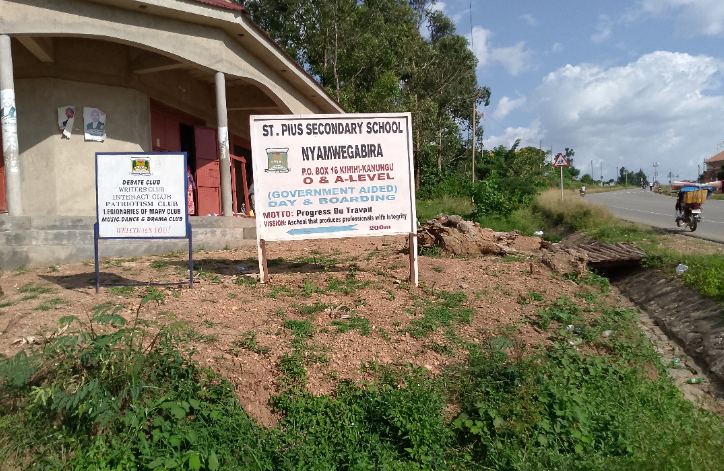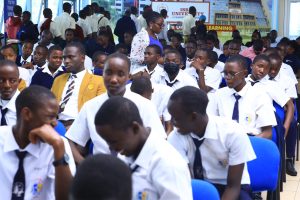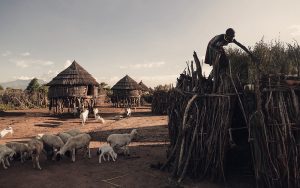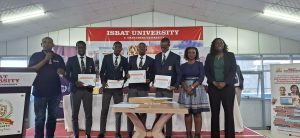ICT Club Launch Report for St. Pius Secondary School, Nyamwegabira

On June 11, 2025, the Uganda Communications Commission (UCC), in close collaboration with Kisubi Associated Writers Agency (KAWA), successfully inaugurated the ICT Club at St. Pius Secondary School in Nyamwegabira, Kanungu District. This commendable initiative forms an integral part of a broader national drive aimed at significantly enhancing digital literacy and empowering students with crucial 21st-century ICT skills. Through active participation in this club, students will be encouraged to engage in creative problem-solving, delve into basic programming, and foster research-based innovation—all perfectly aligned with Uganda’s overarching Digital Transformation Agenda.
The launch event enjoyed a robust turnout, with a total of 32 students actively participating, representing a diverse range from Senior One to Senior Six. The eager participants included dedicated class representatives, responsible prefects, and numerous enthusiastic learners who demonstrated a keen interest in ICT. The gender distribution among the attendees was as follows: Male Students: 21 and Female Students: 11. Each participant formally registered their attendance by meticulously writing their name, class, contact information, and appending their signature on the official attendance register. This impressive turnout vividly underscored the high level of interest and genuine excitement evident among both the students and the school staff.
The day’s program commenced with a formal introduction to the ICT Club. This segment comprehensively highlighted its core purpose, outlined its expected structural organization, and detailed how its activities would operate on both a weekly and termly basis. Students received thorough briefings on their individual roles, the club’s established leadership structure, and the various ways in which they could actively contribute to the club’s progressive growth. A detailed and insightful overview of KAWA CONNECT tools and platforms was then shared with the participants. This included a presentation on various valuable resources such as offline simulations, interactive video lessons, digital textbooks and e-libraries, educational coding games, and access to relevant local content and exam preparation materials. The most exhilarating segment of the day was undoubtedly the hands-on training session. Students were skillfully guided through a series of practical exercises, including installing Visual Studio Code, a widely recognized and utilized platform essential for programming, and creating mobile apps using MIT App Inventor, utilizing intuitive block-based programming concepts highly similar to those found in Scratch. Students demonstrated remarkable aptitude, quickly grasping the fundamental basics and eagerly embarking on experimenting with their own unique applications.
Throughout all the sessions, students exhibited exceptionally high levels of engagement, fostered strong collaboration, and showcased impressive creativity. Working effectively in both small groups and independently, they enthusiastically brainstormed various app ideas, learned to simulate potential solutions, and received valuable individualized feedback. One particularly enthusiastic student encapsulated the transformative experience by sharing, “I never thought I could create a mobile app, but today I made one that sends messages. This is just the beginning!” Despite the overwhelming success of the launch event, the session did encounter a few notable challenges. Primarily, intermittent power supply interruptions posed a significant hurdle, which unfortunately led to delays in practical demonstrations for some learners. This specific challenge emphatically underscored the pressing need for reliable backup power solutions and enhanced infrastructure support within the school.
To effectively build upon this positive momentum and ensure the long-term success and sustainability of the ICT Club, the following crucial recommendations were proposed: Provision of More ICT Equipment: The school would greatly benefit from the acquisition of additional laptops, projectors, and routers. This increased equipment would facilitate greater active participation from a larger number of learners in all future practical sessions. Structured Mentorship: It is highly encouraged that both UCC and KAWA establish a consistent and structured mentorship program. This program should ideally incorporate both in-person and remote guidance to effectively sustain the learners’ motivation and ensure continuous technical progress. Monthly Monitoring: It is recommended that the Club student leaders meticulously submit monthly reports. These reports should comprehensively detail all conducted activities, ongoing projects, encountered challenges, and the continuous progress of their innovations. This structured monitoring will ensure sustained learning and accountability within the club.
The launch of the ICT Club at St. Pius Secondary School represents a profoundly significant step towards fostering digital empowerment in rural Uganda. It has successfully laid a robust foundation for nurturing a new generation of digital creators, moving beyond mere consumers. With the anticipated ongoing support from UCC and KAWA, the club is strategically positioned to drive innovation, cultivate critical thinking, and impart invaluable practical ICT skills among its eager learners. As the students continue their exciting journey of exploring app development, coding, and digital research, they are fully expected to take genuine ownership of their learning journey and contribute meaningfully to the advancement of their respective communities. Special thanks are extended to the dedicated facilitator, Mr. Noah Okwalinga, the supportive Patron, Ms. Kenema Scovia, the visionary Headteacher, Mr. Alele Moses, and all the enthusiastic and committed learners for their remarkable energy and unwavering dedication. Their collective efforts ensured the resounding success of this launch, establishing it as a significant benchmark for other schools within the region.






